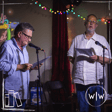
107 Vanessa Fox O'Loughlin/Sam Blake | Crime Author and Influential Publishing Professional
Bestselling crime and YA novelist, and influential publishing professional, Vanessa Fox O'Loughlin aka Sam Blake is on this week's episode of the podcast talking about writing, the craft, working in publishing and the layers of thinking that go into a successful pen name.
Signing up to the Patreon will give you access to the Discord server, where you'll be able to interact directly with Jamie as well as many of the previous agents, authors and editors who have been on the show. You'll also be able to see who the upcoming guests are and put forward questions for Jamie to ask them.
Get a whole month with WriteMentor's Hub for free using the coupon code 'Write&Wrong'.
The Chosen Ones and Other Tropes
Jamie, Melissa and Noami talk about the best and the worst writing tropes!
Click here to find all of our guests' books as well as the desert island library over at bookshop.org.
Click on this referral link to get 30% off your first three months with Zencastr.



















